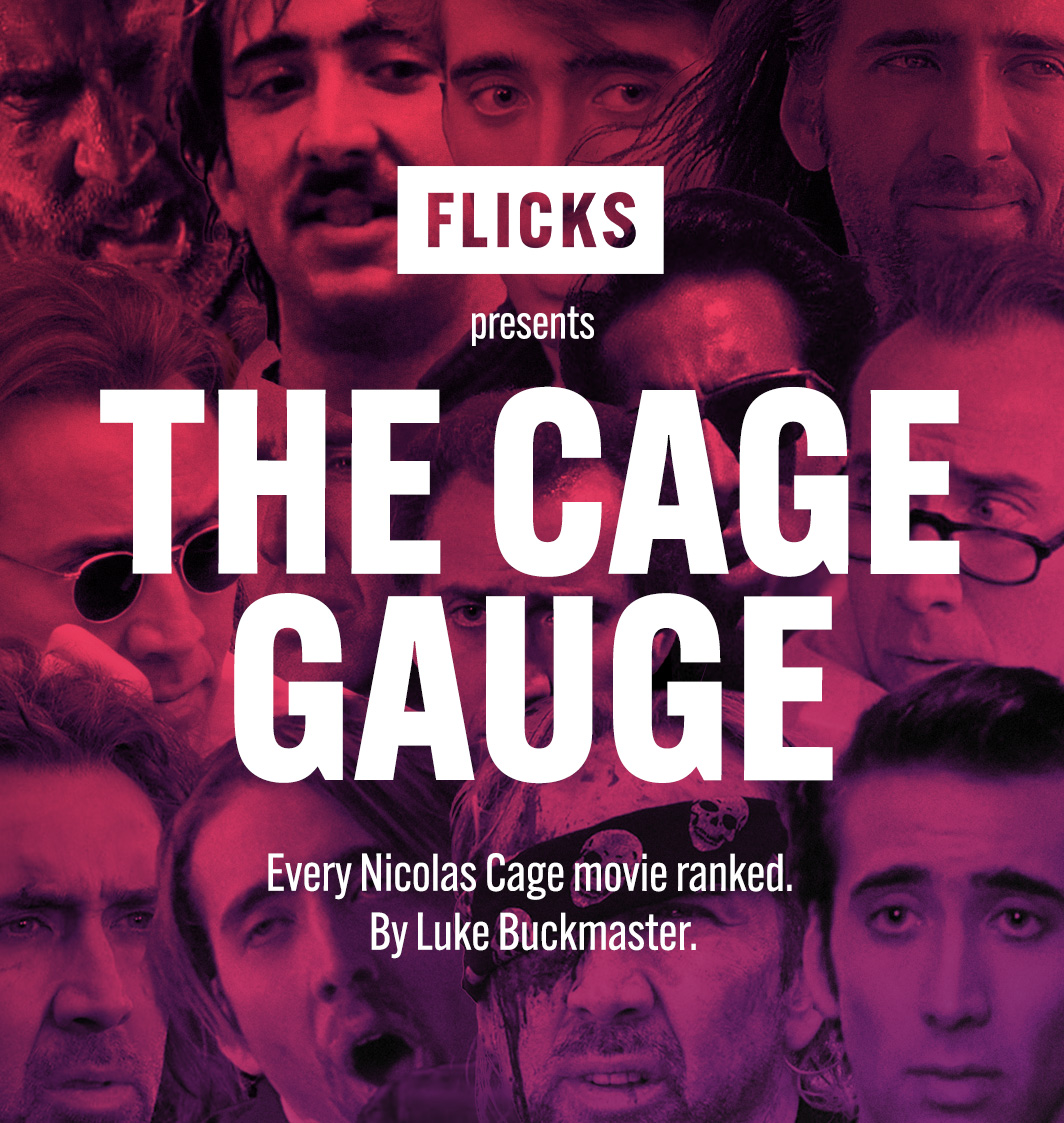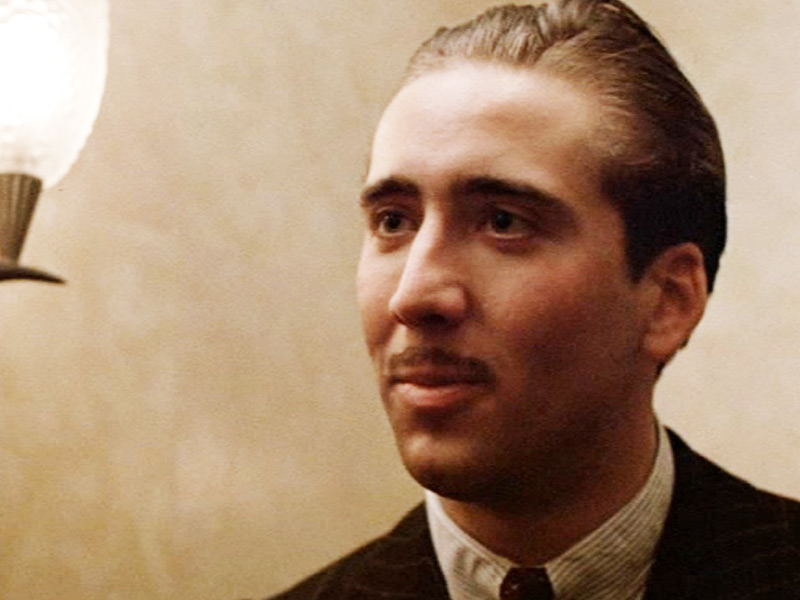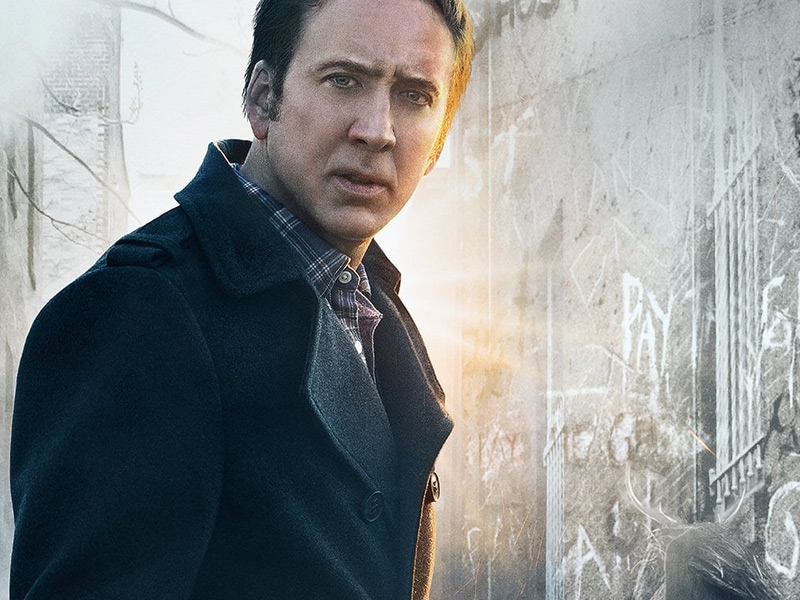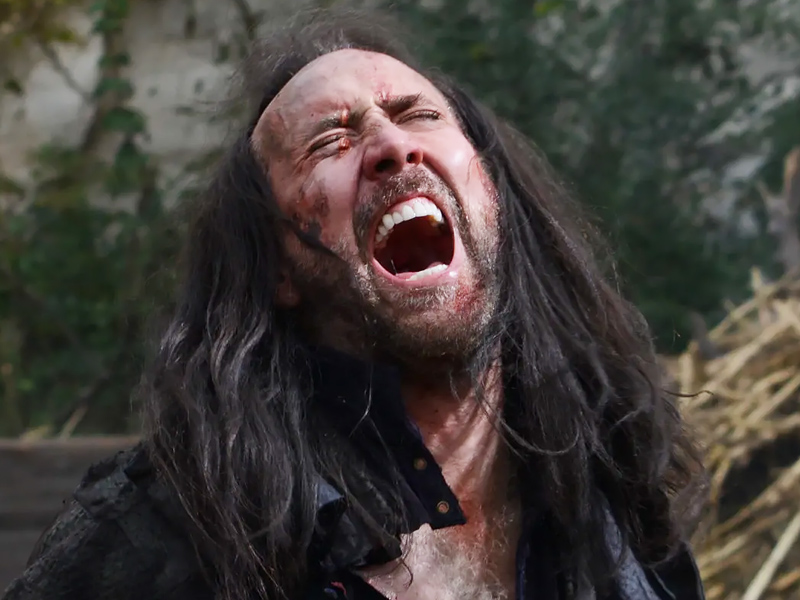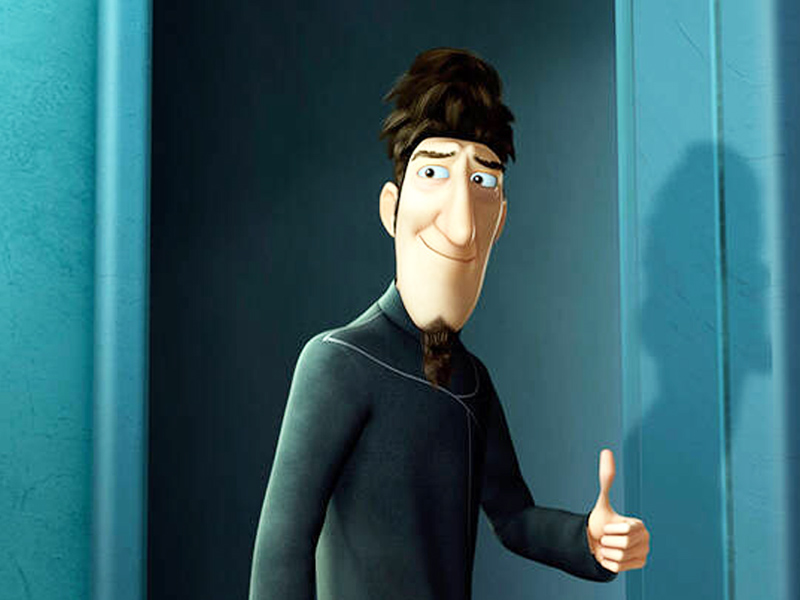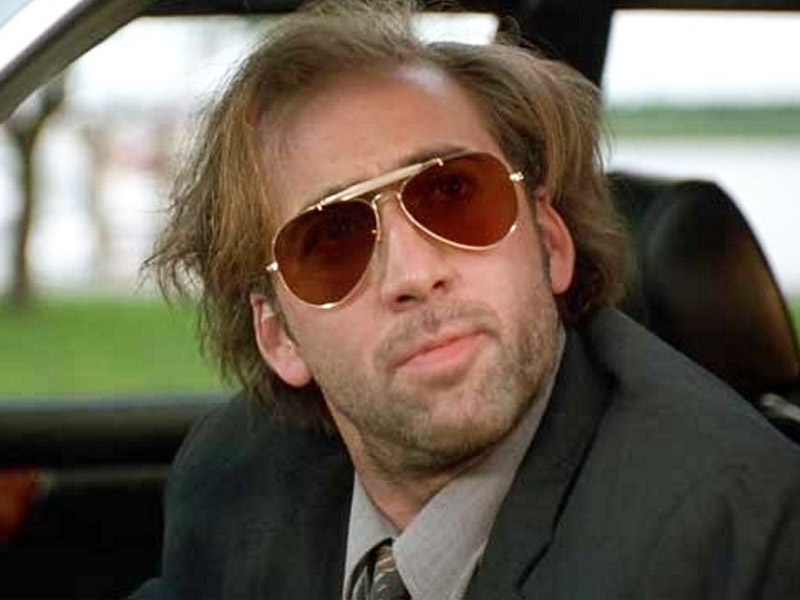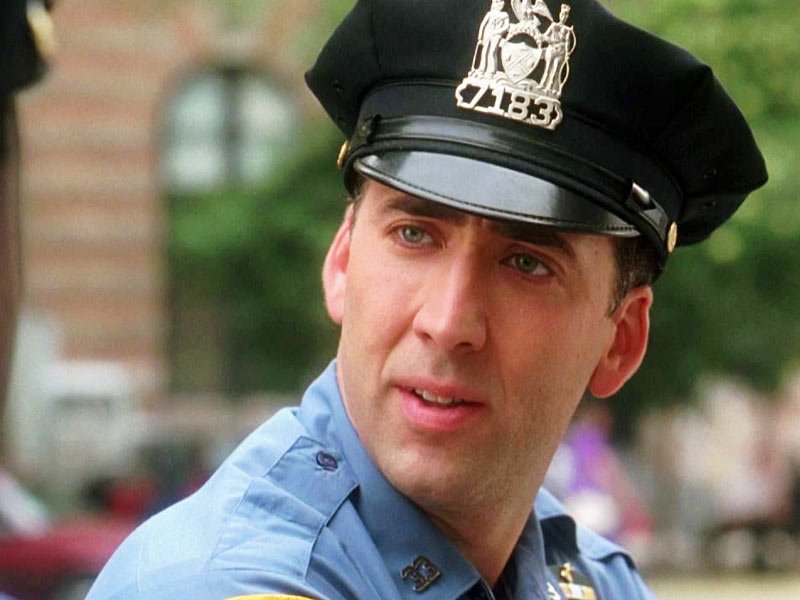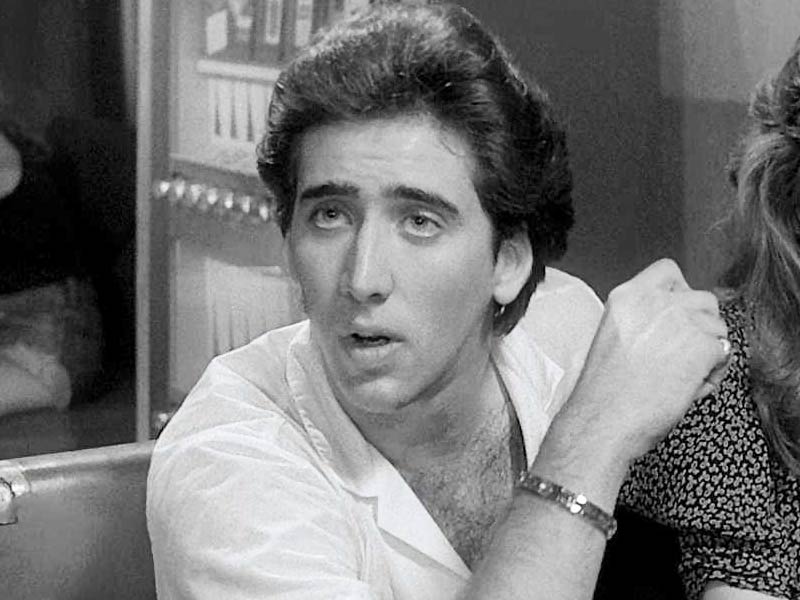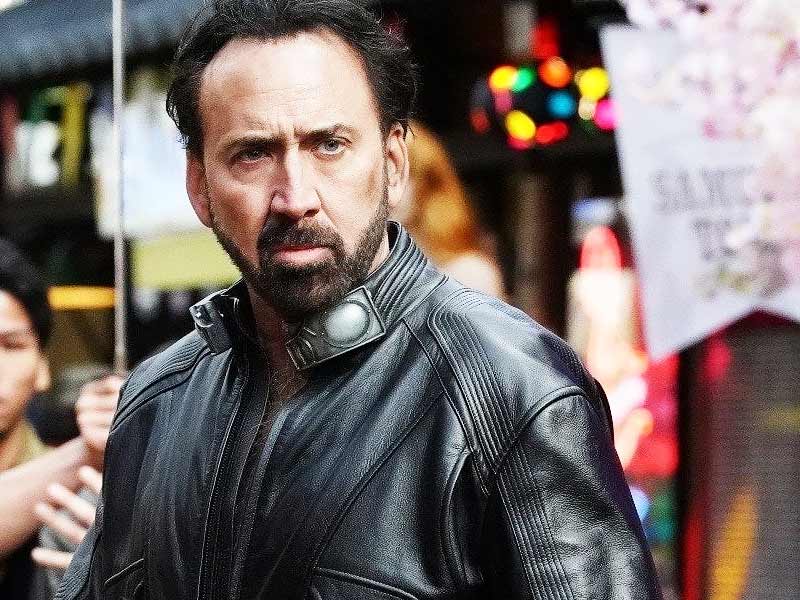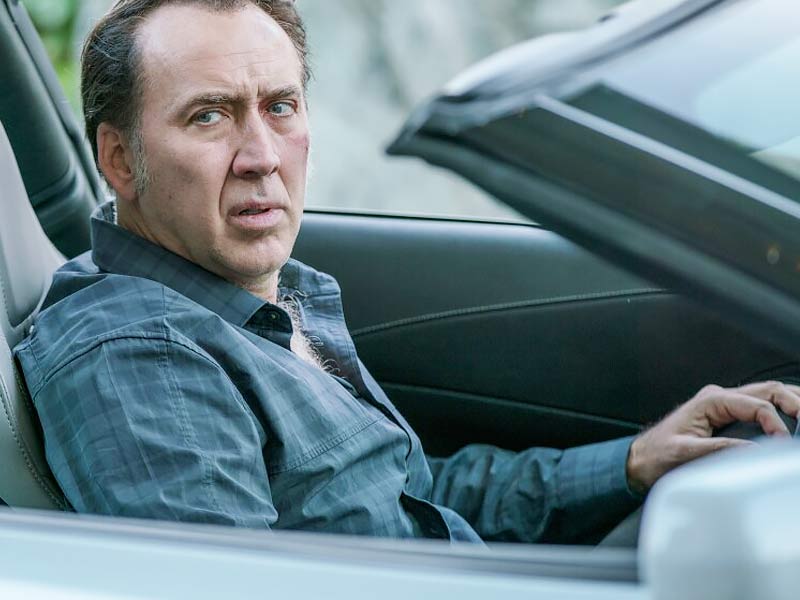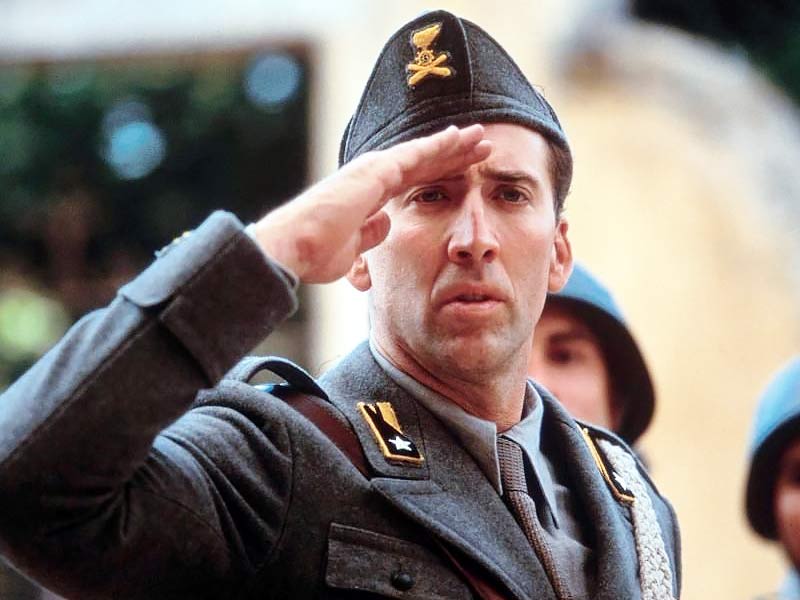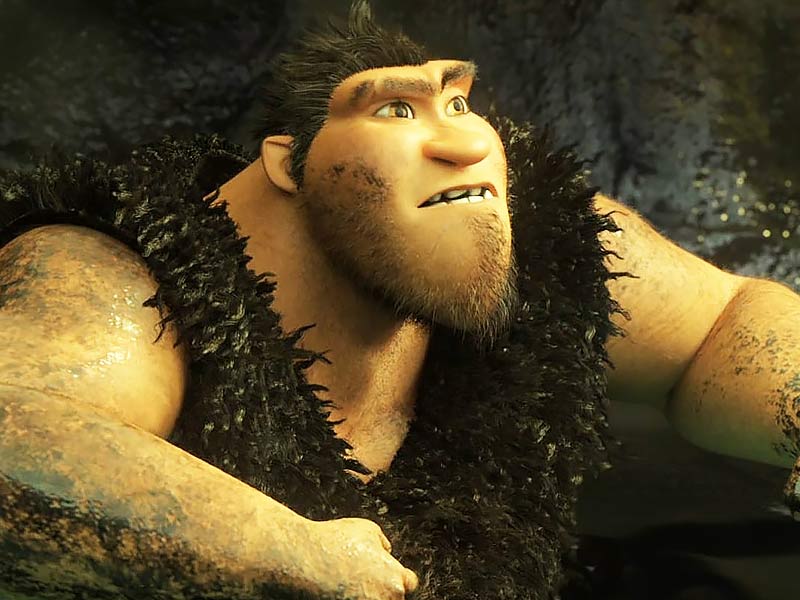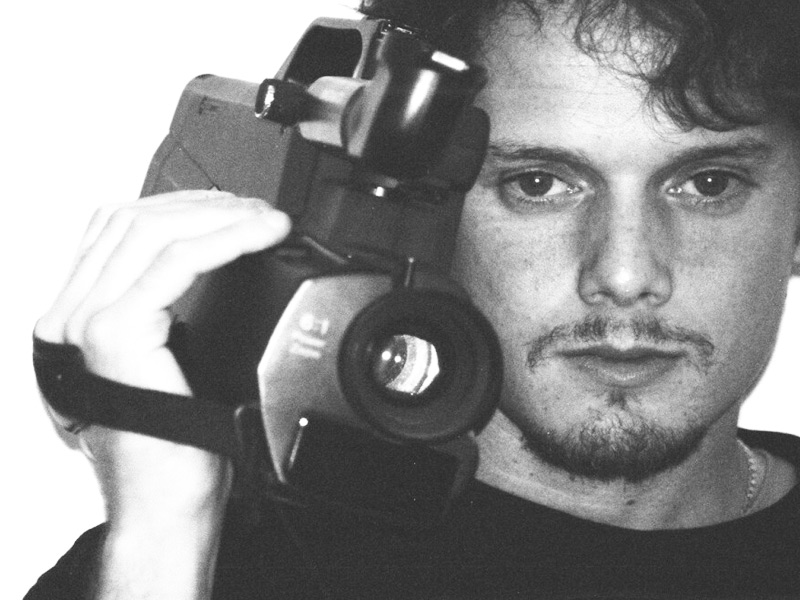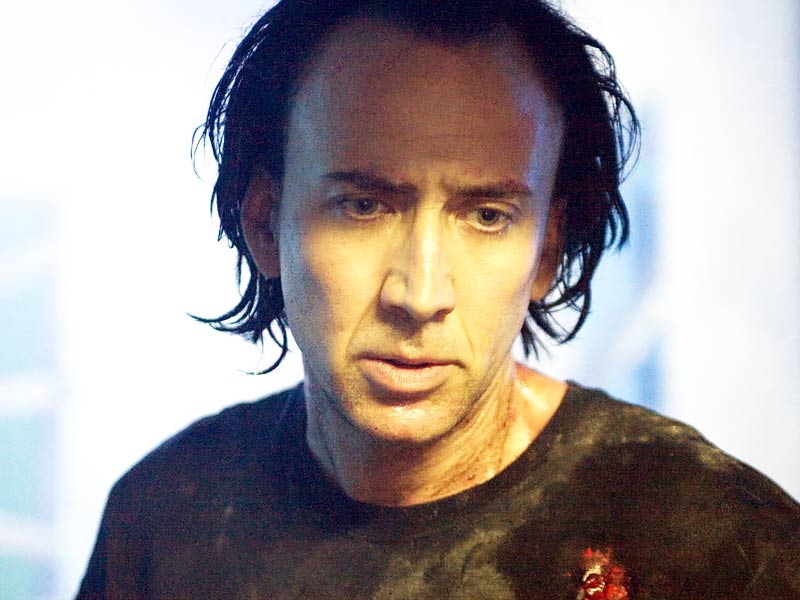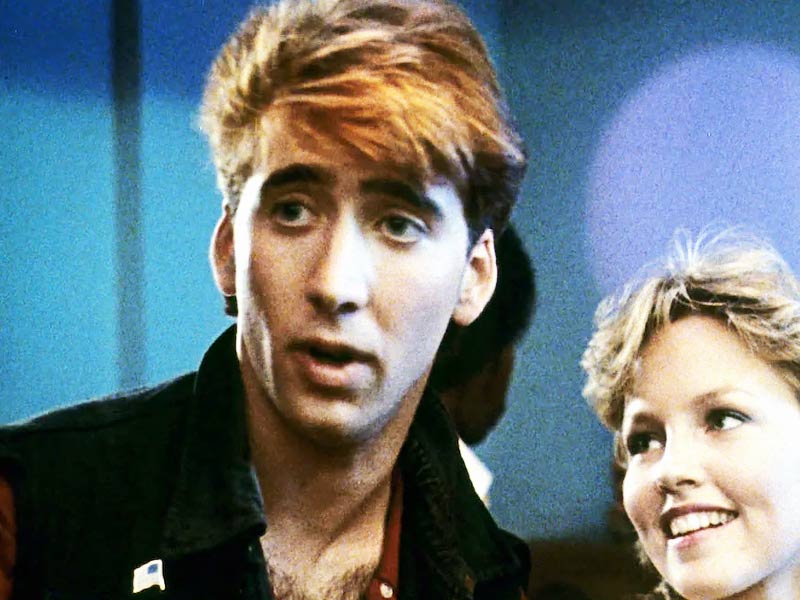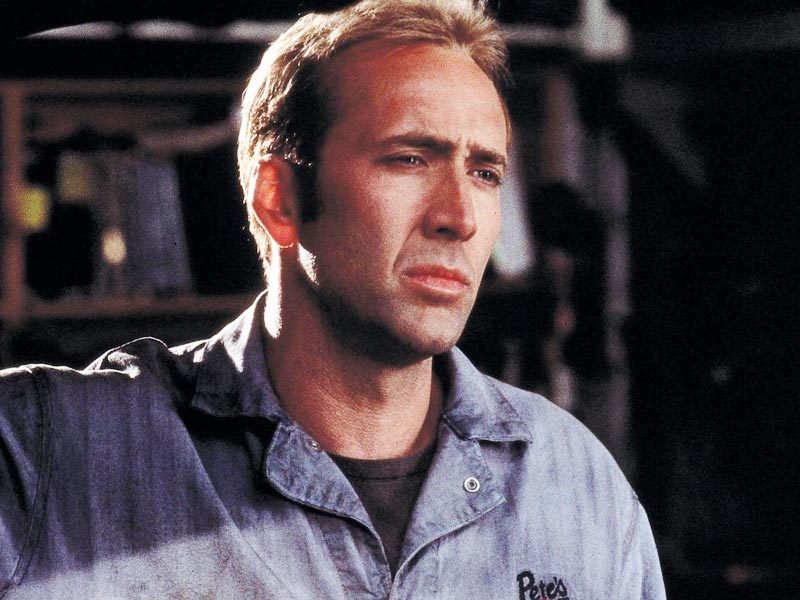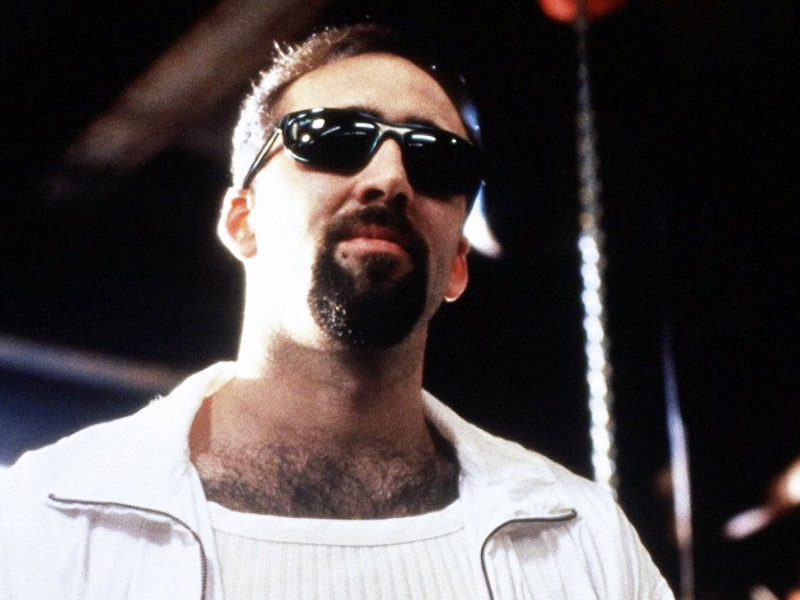Celebrating one of cinema's most original and distinctive actors, the core philosophy underlying The Cage Gauge is that every Nicolas Cage movie is worth watching—because every Nicolas Cage movie has Nicolas Cage in it. Updated upon the release of every new Nic Cage movie (the most recent addition being Dream Scenario), this list uses a unique rating system embracing the actor's beloved qualities. To learn more about The Cage Gauge, visit the about page. This project was created (and all words written by) Luke Buckmaster, who can be followed on Twitter here.
Left Behind (2014)

This list has to start somewhere—so why not with an airborne, apocalyptic, end-of-times Christian drama? Playing as if a bible basher got their hands on an episode of The Twilight Zone, this pious, waffle-filled film sounds weirdly interesting, but is flatly executed with daytime TV soap vibes. Cage’s pilot Rayford Steele is mid-flight when an event of biblical reckoning occurs: loads of people around the world, including his co-pilot, suddenly disappear, presumably whooshed into the Great Beyond.
Our man is the best thing in the film by far, but seems in no mood for experimentation and his performance has an air of unreality about it. Steele delivers over the PA the worst words one can imagine hearing mid-flight: “if you believe in prayer, now would be the time to pray.” A mildly amusing finale involves him landing the plane without being able to see the runway—so his daughter (Cassi Thomson) provides a visual marker by creating an explosion.
Time to Kill (1989)

On rare occasions when Cage's Lieutenant Enrico Silvestri (briefly) explodes, there are flickers of a fiery performance—including a scene towards the end of this amateurish war movie when he wails “I’M SICK TO THE SOUL!” And indeed he is; Silvestri is an intentionally unlikeable protagonist in a morally and ideologically uncomfortable film that eventually arrives at an unambiguous anti-war message.
Set in Italy-occupied Ethiopia circa 1936, it follows Silvestri as he drifts around before attempting to escape the country and return to his wife. In one deeply unsettling sequence Silvestri rapes a local woman—the low point of a production in which nothing and no-one is commendable. Including, as mentioned, the protagonist: a reprehensible man you wouldn’t mind being given the long kiss goodnight.
Inconceivable (2017)

Dressed in trackie dacks, a light jacket and a beanie, Cage’s Brian—a doctor—exchanges “I love yous” in a light-filled room with his wife (Gina Gershon) and young daughter (Harlow Bottarini). Given this is a thriller, we know this dude’s life is going to the dogs pretty soon. The couple hire a nanny (Nicky Whelan) who moves into their guest house; they aren't aware that she's the donor their daughter was conceived from—oh yeah, and an absolute psychopath.
Brian is a placid character who gives the impression of coasting through life, illustrated (perhaps intentionally) in a performance that doesn’t pop or crackle. Director Jonathan Baker’s biggest mistake is that he gives Cage so little to do; ditto for costar Faye Dunaway. The narrative runs around in circles, delaying the inevitable confrontation between the married couple and the aforementioned psycho.
The Humanity Bureau (2018)

Set in a dystopian future where global warming has transformed huge swathes of America into desert, Cage’s Noah Kross is an agent in a government bureau whose job is to assess the worthiness of citizens, sending those deemed useless to a place called New Eden. Kross is glum and subservient but, in the tradition of the protagonists of A Brave New World and 1984, ultimately rebels against the system, compelled by the plight of a doomed single mother (Sarah Lind) and her son (Jacob Davies).
Themes around humans being discarded by the state are expressed ham-fistedly and Cage walks around deflated, as if his soul has been fried in the sun. Kross is an initially complacent personality, defeated by the system, though our man remains in a similar mode throughout—even after his call to arms. Sometimes Cage’s speech intonation is bizarre; for instance when he speaks to an informant character he inserts a gap into the middle of a sentence, asking: “what is…the truth?”
A Christmas Carol: The Movie (2001)

Ebenezer Scrooge is younger than usual in this version of Charles Dickens’ famous Christmas story—one of few points of departure in an otherwise box-ticking adaptation. Cage is the voice of Marley, the first ghost, shackled in chains, who visits the miserly Scrooge wailing “oh hear me Ebeneza!” Marley then broadly outlines the subsequent narrative, i.e. that Scrooge “shall be haunted by three spirits.” Make that four, if you include the Ghost of Very Poor Animation—the film’s rinky-dink aesthetic screaming cheapness.
Cage speaks in a dramatic, syllable-elongating voice that doesn’t sound a lot like him—and certainly isn’t a vocally explorative performance. He delivers a short speech near the start and returns briefly towards the end. A very limiting role, in other words, far too brief and uninteresting to score well on Cage’s most important career yardstick: The Cage Gauge.
Stolen (2012)

Reuniting Cage with Con Air director Simon West, the pair this time deliver a Taken-esque thriller largely devoid of style and vitality. Cage’s Will Montgomery is the “good thief” who moved on from a life of crime but is drawn back by an aggrieved former colleague (Josh Lucas), who believes he was stiffed during a lucrative heist. With his daughter (Sami Gayle) kidnapped, Montgomery must deliver $10 million within 12 hours or the girl gets whacked—prompting lots of running and exasperated expressions.
There’s an action scene with Cage jumping from car roof to car roof, which reminded me of the ending of Wild at Heart (which scores a lot higher on The Cage Gauge). There's also a large fluffy blue teddy bear the protagonist buys for his daughter that brought back memories of the bunny in Con Air (which also ranks a lot higher). Here Cage is workmanlike and down to business, not flashy or eccentric. I wanted to grab this film and shake it to life.
USS Indianapolis: Men of Courage (2016)

Cage is the glue holding together this choppily edited disaster flick, his performance stuck in the stern mode of a by-the-book, personality-free military man. His character Captain Charles McVay is informed that the Prez has selected him for a highly secretive non-combat mission that “could save millions of lives,” involving delivery—via the titular vessel—of parts that would later be used to build the bomb that devasted Hiroshima.
En route the Japanese attack and sink his ship, resulting in McVay and colleagues bobbing about in shark infested waters, looking very bothered and out of place. Cage paddles furiously in some scenes and grows increasingly parched, slowing down his speech. The man wants to go home, you see, but he is also a Man of Courage. The film is dodgy as all get-out, with shonky special effects and boats that look like bathtub toys.
Teen Titans Go! To the Movies (2018)

Full of noise and bling, this scatterbrained spin-off of the popular Teen Titans TV series made me think: “man, I’m old.” After the titular superhero group fight a gigantic pink balloon villain thing (because colourful!) they burst into song (because music!) with a chorus repeating the words “Teen Titans” (because…brand recognition?!) Then the Justice League flies in—including Cage’s holier-than-thou Superman, who smugly tells them “if you keep playing the fool, you’ll never be seen as real heroes.”
This provides some character motivation, the Titans vowing to become legit heroes—not to improve the world but so they can have a movie made about them. Señor Cage doesn’t have much to do and delivers his (purely vocal) performance sleepily. By contrast the film itself is certainly energetic, but also permanently distracted—its stop/start structure suggesting it always wants to be someplace else, doing something else...perhaps somewhere with another giant pink balloon villain thing.
Next (2007)

The stage act of Cage's martini-swilling magician Cris Johnson incorporates the usual things, such as summoning doves and guessing where audience members come from. But this dude is also a soothsayer, explaining via voice-over “I can't see everyone's future, only my own, and only within two minutes." Johnson experiences premonition-like visions of the near-future, making him valuable to Julianne Moore's FBI agent—who wants him to help stop a potential nuclear weapon-triggered apocalypse. Natch.
There are faint flickers of fun—Johnson for instance dodging punches then making coins come out of his sleeves—but those moments are over pretty quick. Johnson smiles a lot, with a greasy demeanor, like he should be selling cars. In one scene Cage watches news footage while wearing a device that pries his eyelids open, Clockwork Orange style, marking the peak of weirdness in an overall lackluster film.
Rage (aka Tokarev) (2014)

When the daughter of Cage’s former gangster Paul Maguire goes missing, in an apparent kidnapping, Danny Glover’s cop tells him: “I don’t want you falling back on any of your old habits. Let us do it our way.” But we know that ain’t gonna happen. Convinced his daughter’s kidnapping is payback for dirty deeds committed in his former life, Maguire—now a successful businessman—takes the law into his own hands, spearheading a boilerplate revenge narrative.
Cage delivers a downbeat performance that eventually hits a higher emotional gear in the last act. "Shit’s about to get radical,” he tells his mates around a pool table. And shit does, sort of, get radical, in violent but dramatically uninteresting ways. For a film with the title Rage (released in some countries as Tokarev) there sure is little of it. I did enjoy a scene when our man explodes 72 minutes in, yelling at a two-bit colleague “YOU ARE A RAT! RAT! RAAAATTTT!"
The Boy in Blue (1986)

There aren’t many films about competitive rowing—and this one is a veritable love letter, starring Cage as fresh-faced oarsman Ned Hanlam. We meet him in the thick of a race, Cage making the requisite face-scrunching expressions to indicate a physically demanding sport. After it he’s gulping down moonshine before punching a bloke from a higher social standing, director Charles Jarrott making it clear the protagonist—a naive and exploitable young man—is from the ol' “wrong side of the tracks."
Cage flashes a big, toothy, gawky grin, conveying a person in the process of finding themself. This early performance in his career suggests the same about his acting abilities: that he was in the process of finessing his style. The film has an oddly flippant tone, bouncy and jivey, although it obviously wants to be taken seriously as a drama. The eventual final race is triumphant in the expected way—Cage winning while an uplifting score soars on the soundtrack.
City of Angels (1998)

In this sloshy remake of Wim Wenders’ masterpiece Wings of Desire, Cage plays an emotionally sensitive angel, Seth, who like the rest of his brethren watches over us mortals and gets invested in the details of our lives—as if human beings were merely TV drama for the gods. Seth falls in love with Meg Ryan’s medical surgeon, who he gazes upon obsessively, his face frozen in a yearning look that screams: “I’m here, I care, I’m sensitive.”
Moments intended to be profound come across goofy, such as when Cage observes Ryan eating a pear then wonders what it would taste like (the answer: “sweet, juicy, dissolves in your mouth”). Later, in the wake of a terrible event, he decides to go on a spiritual quest—leading him, oh dear, to the fruit section of the supermarket. The film is annoyingly cheesy and generously samples from songs that spell its subtext.
The Croods: A New Age (2020)

"We've got some angry kangadillos on our tail!" Cage’s Grug Crood yells in a chase scene through a canyon, his family of fellow primitives riding atop a weird blue beast. The most interesting thing about this prehistoric lug is his temper problem, which means he occasionally erupts into tantrums. For instance Grug—who is elastically voiced by Cage—yells at a young man, who has designs on his daughter, "NO YOU 'COME ON, MAN' I'M GONNA CHILL YOUR A..." But his wife interjects too quick, calming him down, clipping the Cage.
The plot involves the Crood family finding an Eden-like paradise where there are advanced people, in reasonably modern looking clothes, with reasonably modern inventions. But it’s like the classic Eden in that it's a corrupted place (needless to say, nobody is watching this for the biblical allegories). Like its 2013 predecessor, which ranks higher on The Cage Gauge, the film is aesthetically colourful but narratively dull.
The Cotton Club

Cage plays Vincent Dwyer, the brother of Richard Gere’s Dixie: a jazz muso who fraternizes with the wrong crowd—the mob—in New York circa the 20s and 30s. Both speak with a thick Brooklyn accent, Cage in one scene discussing something that's “behind the coy-ton” (translation: “behind the curtain”). The central location is the titular jazz club, which helps Francis Ford Coppola’s film come alive with peppy period details derived from decor, costumes, music and dancing.
Cage appears on screen fairly regularly, but is rarely afforded more than a few lines of dialogue at a time. In one scene he bursts into a bar and shoots up the place, which would have been a choice spot for an angry Cageian rant—but Coppola moves on quickly. In another, Dwyer argues with Dixie, yelling “I’m a tough guy now!” But again the scene (and the Cage) is clipped. The film vividly captures a cultural scene and historical moment, but the narrative is overcrowded and easily distracted by the aforementioned period details.
Vengeance: A Love Story (2017)

We meet Cage’s cop John Dromoor in the shooting range—he’s a crack shot—then follow him to a dramatic sting during which a colleague gets shot. Then the film switches away from Cage for a long time, following a single mother (Anna Hutchison) who is brutally assaulted then gang raped. When she takes the vile perpetrators to court, and the case plays out in the key of shrill melodrama, we sense the perpetrators will get off—establishing a revenge movie arc.
Cage looks glumly focused, with little to do until the premise finally kicks in and he seeks his vengeance. His voice is slow and carefully modulated: this is a man who cannot be rushed or ruffled. At one point Dromoor stands near a dam, mist rising in the air, looking up at a bird, as if in spiritual counsel. Cage has gravitas and is on a different level to everyone else—the other performances laboured and amateurish. Still, it’s a frustratingly small role. I craved more mist, more bird, more CAGE.
Pay the Ghost

“There is something different, there is something mysterious out there—and it’s taking children on Halloween!” It’s difficult to deliver a line like that without it sounding like complete tosh, but Cage pulls it off as professor Mike Lawford, who is a literary type—well schooled in the likes of HP Lovecraft and Edgar Allen Poe. Shortly after his young son asks him—during a Halloween parade—“did you pay the ghost?”, the little tacker disappears, presumably nabbed by a cash-strapped apparition.
Cage subsequently behaves like a man who’s had the wind knocked out of him, wandering around trying to locate his offspring, drifting into dingy buildings and a laneway where graffiti on a wall states “pay the ghost.” Does this ghost take tap-and-go? Our man does a reasonable job keeping his head above water while the drama and mystery of this oddly momentumless film sinks around him.
Trapped in Paradise (1994)

At the beginning of this Christmas-themed comedy-drama about bank robbers, Cage’s Bill Firpo pockets a cash-filled wallet he picks up from the ground. But he sees the person has a family with kids and in the next scene attends confession, establishing the thief with a conscience. The same cannot be said of his two nincompoop criminal brothers, who are morally and intellectually deficient, saying stupid things like "they didn't have a shred of evidence—other than our fingerprints." It's a familiar dynamic: the sensible, relatively smart criminal barely tolerating bird-brained colleagues.
Cage gives the role relatability but not much flair, occasionally (and only briefly) losing his temper. In one mildly amusing scene he yells at his direction-challenged brother "FOUR LEFTS IS A SQUARE, YOU IDIOT!" A moralistic narrative positions the criminals around the Christmas table at the house of the kindly manager whose bank they just robbed; their moral errors of course catch up with them.
The Runner (2015)

In the aftermath of the Deepwater Horizon oil spill, Cage’s Louisiana congressman Colin Pryce delivers a grandstanding speech pleading for federal support for local businesses, because “everything I know, everything I love is at risk.” It’s a convincing Southern accent in a performance that always feels authentic, in that slippy, half-real style put on by politicians managing their public personas. Pryce can’t be bought by fossil fuel lobbyists, but finds his career potentially destroyed when the media discover he’s having an affair.
Cage starts to look a bit bedraggled when the film veers into melodrama and the protagonist falls from grace. There's an absence of unifying emotions in writer/director Austin Stark’s script; nothing to morally tie it together. I kept waiting for the “real” part of the story to kick in but it never arrived.
Season of the Witch (2011)

At the beginning of this medieval supernatural adventure we meet Cage’s knight Behman, oh he of shaggy beach hair and robe-like outfits, on the battlefield, smirking and joking to fellow knight Ron Perlman. Then they carve it up during an onslaught of blood and violence. Later the pair travel to remote towns affected by the Black Death, Cage wrapping his tongue around heavy lines such as “sheep roaming free and no shepherd in sight.”
Cage speaks in slow, stilted cadence, but suddenly—especially when conversing with Perlman—can slide into a different kind of pronunciation that feels playful, almost sleazy. The combination is jarring, as if he couldn't decide between the serious slow-talker or the rascally troublemaker. The film shares a similar problem: it doesn’t seem to want to be schlock (which it is) nor to take itself too seriously (which it does).
Trespass (2001)

Joel Schumacher‘s home invasion thriller is a chamber piece that has lots of squawking and yelling but little intensity. As diamond dealer Kyle Mille, Cage wears oversized glasses, a vest and a button-up shirt with a very chunky collar, his outfit screaming “rich but morally dubious businessman, from a time fashion forgot.” He has a fancy car, a palatial house and Nicole Kidman as wife, but is forced to deal with thieves (led by Ben Mendelsohn) who bust in and demand some of those sparkling stones.
Incapacitated for most of the film, the action happens around Cage rather than as a consequence of his character’s agency. One scene, 24 minutes in, has him shouting at vein-bursting volume: a burst of Cage dynamite, but soon to fizzle out. Everybody in his movie seems helpless—even the robbers—and the dialogue is very bland.
Outcast (2014)

We meet Cage’s Gallain in the thick of a Crusades-set action scene, riding a horse in full knight garb, cutting down enemies. Having just invaded a village, Gallain wants to stop, exclaiming “there’s women and children in there!” As soon as our man speaks, the question beckons: what accent is this? It sounds a bit English, a bit Scottish, a bit American, a bit Jabberwocky. We can’t wait to hear him again just to try and get out heads around it.
But after that intro it’s a llloonnnggg and painful wait for Cage’s return, a poorly paced plot detailing efforts to defeat a maniacal king who seized the throne in Song dynasty-era China. When Gallain is re-introduced he’s referred to as “the white ghost” and has a bung right eye, a big black robe and a love of wine. The strange accent continues: at one point, three sheets to the wind, Cage sounds a little like Russell Brand when he screams “here’s your fucking opium!” to the film’s real hero (Hayden Christensen).
Astro Boy (2009)

This so-so spin-off of the famous manga series has Cage lending his vocal strings to wacky scientist Dr. Tenma. In his first speaking scene, Tenma rabbits on to his son about how “it’s important to keep studying, onwards and upwards” before said son is killed in a laboratory accident. Grief-stricken, Tenma creates a robot that looks just like him—Astro Boy—who he equips with rocket boots. Because why not?!
This version of Tenma, who has a large nose and silly goatee, is modelled to look loosely like Cage. As the caring father who speaks in measured sentences (rather than the wacky scientist, which is what we really wanted) Cage's vocal performance is decent—but his character's grief never resonates and the script is too concerned with backstory. There are many scenes that aren’t narratively interesting—the hero shown bumbling around with friends for instance rather than embarking on adventures.
Amos & Andrew (1993)

We meet Cage’s dunderheaded goon Amos in prison, toothpick in mouth. He's approached by the police chief (Dabney Coleman) with an odd proposition: enter the house of a wealthy and erudite Black writer—Samuel L. Jackson’s Andrew—and pose as a home invader, pretending to hold him ransom, then give himself up. The chief has made a bad error—mistaking Andrew for a burglar—and is attempting to cover his tracks.
This core plot information isn’t defined for a long time; for this period Cage’s role is unclear and he hangs from the narrative like a loose thread. Amos is a familiar empty-headed crook character, who is funny but not funny ha-ha: the kind of guy who blunders into dangerous scenario and gets locked up for silly reasons. The film never comes alive; not even in the chemistry between Jackson and Cage.
It Could Happen to You (1994)

Cage’s salt of the earth cop Charlie Lang is, in the words of the narrator, simply a “very decent guy.” Director Andrew Bergman is at pains to remind us of this, with a vision of the protagonist helping a blind man cross the street one of many bits in the script marked “top bloke!” Cage got the memo, giving the protagonist an aw-shucks straightforwardness that paints an idealistic impression of a police officer as purely, utterly, wholly a force of nothing but good.
In a premise-articulating meet-cute, Lang promises an on-the-skids waitress (Bridget Fonda) half of his lottery ticket should he win. Hey presto: Lang wins and keeps his side of the deal. There’s nothing flashy or idiosyncratic about Cage’s performance: he’s the straight guy opposite Fonda’s more interesting female lead, who is flaky and unpredictable. Devoid of moral dimensions, the film is devoted to reinforcing the idea that Lang is decency personified. We get it!
Rumble Fish (1983)

Cage's Smokey assures the leader of his gang, Matt Dillon's Rusty, that “we are gonna be there”—referring to an upcoming rumble with an enemy. This is a well-acted but small performance, limited to a character who isn’t very interesting and not important to the narrative, which is centered around reckless youth and involves the return to town of Rusty’s older brother (Mickey Rourke).
This minor work from Francis Ford Coppola is presented in crisp monochrome, with items of the mise en scène—fish for instance—highlighted in bright colour. This emphasis on style over substance is partly why, when the first fight scene arrives, there isn’t a great sense of stakes; the humans are there to serve the aesthetic. The film’s artifice is conceptually interesting but constantly disconnects us from its narrative reality. Sadly for Cage fans, our beloved actor is very much on the peripheries.
Prisoners of the Ghostland (2021)

Sion Sono's dystopian sci-fi was always to be remembered for attaching bombs to Nic Cage’s testicles. What kind of movie would it be if at least one of them didn’t go off?! Set in part of a future Japan called Samurai Town, Cage’s antihero (credited only as “Hero”) is introduced all guns blazing in an introductory bank robbery, spitting out boilerplate lines such as “put your hands where I can see them!” Soon he’s made to eat humble pie, with the attachment of aforementioned testie detonation devices and his appearance near-naked in the town square, where he is forced to track down a corrupt governor’s missing daughter.
This shaggily structured film has low-rent grindhouse vibes, with Cage’s stoic performance in the tradition of the laconic lone wolf action hero. Sono doesn’t give the big C much opportunity to muck around, and doesn’t exploit the uniqueness of the Cage. When one of the aforementioned bombs goes off it’s a wickedly fun moment, but its impact is drawn from a special effect—not Cage’s reaction.
A Score to Settle (2019)

“Scores have to be settled,” Cage's Frank Carver grumbles after he’s released from the big house—set free because he has a case of insomnia so bad he’ll die if he doesn’t get some shut eye. Out and about, looking rather haggard, with a tone of voice that says “I’ve seen things,” Frank is determined to exact revenge on the people who set him up for a crime he didn’t commit. So: he arms himself to the teeth, walks around trying to get answers for this and that, and delivers revenge to various nogoodniks.
Making the piddling plot of this B grade revenge movie a little more interesting, and giving the performance some points for originality, is Frank’s insomnia: he’s sick, tired and out of it, allowing Cage space to configure a different take on the grizzled “no fucks given” tough guy. An unexpected surprise occurs one hour in, when Cage—his face red and banged up—takes to a piano and performs a sad tune, then responds to his companion in song. This scene left me craving a Nic Cage action musical.
Captain Corelli’s Mandolin (2001)

Cage's Italian accent is something to behold in this soapy WWII romance—but for the wrong reasons. A convincing accent is about imitating reality: recreating a particular way of speaking. Cage's penchant for experimentation may help explain why this accent sounds goofy, even preposterous, despite his own father being of Italian descent. The cheesiness of the script doesn’t help either, tossing around lines such as “I wrote you that song because I love you; I don’t care if the world knows it.”
There is little chemistry between Cage and Penélope Cruz, who plays the woman charmed by Corelli and his mandolin-plucking ways. We want them to get together just so the film can end. Set on a picturesque Greek island, director John Madden brings a postcard vibe despite heavy-handed treatment of war movie themes i.e. the terrible human cost of armed conflict. Cage’s, shall we say, eccentric accent scores a couple of points for originality.
The Croods (2013)

When we meet Cage’s Grug Crood he’s making a series of aggressive beast-like noises, such as “aaahhhhhh!” and “abbookaaabbbaaa!” (which are difficult to spell). It’s a highly vocal performance, shouty and energetic, though Crood—the patriarch of a family of cavepeople—is also a fearful father, afraid to leave his home. This is reflected in an early line, which I shall type in caps to emphasise its shouty delivery: “WE DO THIS FAST, WE DO THIS LOUD, WE DO THIS AS A FAMILY! AND NEVER NOT BE AFRAID!”
The family leave the comfort of their cave and experience life outside, with Grug slowly changing his attitude that “new is always bad!” while maintaining his belief that “food fixes everything!” This is a film that woos younger audiences by throwing bling at them in lieu of a thoughtful, well-written story. Cage does what he can, but his wings are clipped.
Love Antosha

It would’ve been wrong for Cage to have delivered a distinctly Cage-like performance in this quietly affecting documentary, because its focus lies elsewhere—on the life of the late Anton Yelchin. Yelchin was an actor who starred opposite Cage in Dying of the Light and passed away in a car accident in 2016, age 27. The film is tender, sweet and sad, laced with home footage of him acting, singing and goofing around, as well as clips from his movies and interviews with many of his famous colleagues.
Cage performs a voice-over reading the actor’s written reflections, encompassing diary entries, letters and emails. Cage first starts speaking 21 minutes in, reading out a journal entry (“dear diary, today I had my first kiss…”). Later he verbalizes Yelchin’s study notes, articulating for instance that Travis Bickle “is a reflection of the history of masculinity in film.” Using Cage’s voice is a sweet gesture, but slightly confusing conceptually—given we know this isn’t Yelchin speaking. This title is a tough one to place in The Cage Gauge, which was set up to assess a different kind of experience.
Bangkok Dangerous (2008)

Cage’s hired killer Joe goes on a date with a deaf-mute pharmacist in the Pang Brothers’ Thailand-set action flick—because even assassins have emotional needs. The story rehashes the classic “one last job” chestnut, with a long-haired Cage, as a cold-blooded professional, preparing to “get the money and disappear.” It won’t be that easy, of course, with Bangkok gangsters making formidable foes—and one target on his hit list being the Prime Minister.
Cage speaks in carefully modulated sentences, offering pseudo philosophical commentary such as “there’s big money in misery.” Joe takes a younger man under his wing and mentors him on how to be an assassin…it’s all very boilerplate. A canal-set action scene is a highlight, featuring the great man—in aviator glasses and a snap up brim hat—switching a boat for a motorbike, then leaping off the bike and into a bad guy’s vessel. As he does this of course the bike hits a wall behind him and spectacularly explodes.
The Retirement Plan (2023)

There's something a little off, something a little too casual about Cage's portrayal of a retired assassin whose inner beast is awakened when goons come after his estranged daughter. Unkempt and clad in Hawaiian shirts, Cage’s Matt looks a little like Matthew McConaughey from The Beach Bum, with a character arc reminiscent of a Liam Neeson thriller. When we meet him he's passed out on a beach, empty bottle in hand, soon to explain to his young granddaughter (Thalia Campbell) that he doesn't know how old he is because "I stopped counting when I turned 30."
The Retirement Plan's script is despairingly conventional and cookie-cut, and all the performances other than Cage's suck. The fun comes from watching Matt’s obscured previous self resurface in his current, over-the-hill form, a vaguely Jekyll and Hyde-ish dynamic that Cage makes entertaining, without hitting any big notes of originality or innovation.
Valley Girl (1983)

Martha Coolidge’s pleasantly inconsequential rom-com opens with gossiping girls talking trash in a food court. Soon they're talking trash on a beach—saying “what a hunk!” and “he’s hot!” when gawking at Cage’s high school student Randy. Randy is told there’s a party happening in “the valley” (referring to the San Fernando Valley) but this chap is from the Hollywood hills. There's animosity between the two communities but Randy rocks up at the shindig anyway, looking adorably doofus-like in a long sleeve red shirt and black vest. He starts dating Deborah Foreman’s “Valley Girl”.
The film's low stakes are reflected in lines like “hey, that’s my mother’s car!” The role offers little room for innovation: the script needs Cage to be naive and a bit feather-brained—relatable as a young man still finding himself. As an actor he was, also, still finding himself, delivering a sweetly familiar performance as a slightly awkward hard-to-hate character.
Gone in 60 Seconds (2000)

"Remember: the car is you, you are the car!" Cage’s Randall Raines says this to a bunch of kids at a go-kart track: a rare moment of levity in this heavy-handed Bruckheimer-produced action flick, hinged plot-wise on Raines’ mission to steal 50 cars in 72 hours. The protagonist quit the bad ass life of a car thief but re-enters the scene to save the skin of his no-hoper brother (Giovanni Ribisi).
Director Dominic Sena’s overly serious approach has a smothering effect, muting Cage's performance and choking the charm out of what could have been a breezy popcorn flick. When organising his heist, calling the shots and delivering potted monologues, our Nic's performance clicks into a slightly higher gear—at least a few extra miles an hour. There's some brief but quality hand acting, one moment (which made the trailer) culminating with Cage pointing his index fingers upwards and declaring "ok, let's ride!"
Kiss of Death (1995)

Physically transformed into a built-like-a-brick-shithouse lug, Cage’s strikingly different appearance in Barbet Schroeder’s gangster movie gives his performance some novelty. At a strip club 20 minutes in, Cage’s crime boss “Little Junior” Brown is on the ground doing bench presses—but lifting up and down a woman instead of weights. Brown is the man who inflicts pain; who sends a message; who snarls lines like “you fuck with the bull, you get the horns!”
The film is loaded with wiseguys making dodgy deals and crooks getting busted by cops, with sporadic moments of high impact violence. A rote overarching narrative follows an ex-con (David Caruso) who cut a deal with cops to rat on his old associates. Directed evenly but flatly—no great highs or lows, peaks or troughs—the film has a spunky A-list cast (including Cage, Helen Hunt, Stanley Tucci and Samuel L Jackson) although this is nobody’s finest hour.

